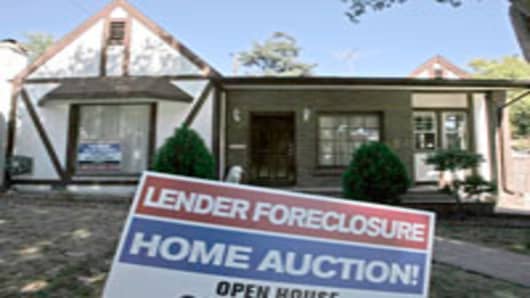You wouldn't know it from the hit their stock took on Friday, but the top title insurer, Fidelity National Financial claims it will not be hit by additional claims exposure thanks to the robosigning scandal at some of the nation's largest lenders.
"FNF believes that these policies will not result in additional claims exposure to FNF because the new owners and their lenders would have the rights of good faith purchasers which should not be affected by potential defects in documentation," the company notes in a statement.
"Even if a court sets aside a foreclosure due to a defect in documentation, the foreclosing lender would be required to return to our insureds all funds obtained from them, resulting in no loss under the title insurance policy."
Title insurers protect home buyers against losses in property ownership disputes. No question the admissions by GMAC, JP Morgan Chaseand behemoth Bank of Americathat tens of thousands of foreclosure documents may have been signed improperly will result in a slew of legal challenges. It will also result in a slowdown in housing's recovery, as literally millions of foreclosures sit in limbo.
"We have to move those through before the housing market can get stable prices and can become a stable market that people can really depend on," says Kurt Pfotenhauer, CEO of the American Land Title Association. "The long term impact is that we have slowed the process even more."
Investors, who, make no mistake, are crucial to this housing recovery, made up 21 percent of all home buyers in August, and they largely bought foreclosed properties, which accounted for 22 percent of all homes sold. That's a big chunk of the market, and it doesn't even account for foreclosed homes that sold at auction.
"The long term impact is that we have slowed the process even more.""
Pfotenhauer says investors shouldn't worry about REOs (bank owned properties) that they've already bought because, "the vast majority of these properties were bought in good faith, so buyers of good faith have rights as well; they are dependent on a court order, a court decision, that has the binding force of law."
Of course the original home owner who was foreclosed on may have recourse against the decision that led up to that court ruling, but that "is probably going to be a matter that is worked out down the road, and it is probably going to be a financial settlement by the bank, which may not have properly ordered the paperwork, and the person whose rights were not fully recognized," adds Pfotenhauer.
Still, some investors will take pause, and those who don't want to take pause may have to, as the inventory of available foreclosures plummets due to banks halting foreclosure proceedings and some sales of REOs.
"We were on the phone Friday, Saturday with lenders, with Fannie Mae, with Freddie Mac, trying to work out what it is the title industry is going to need in order to place title insurance on these investment properties going forward," says Pfotenhauer.
Still, some argue that delay will be a boon to the greater housing market because a smaller inventory of foreclosed properties selling at a discount will put a floor on home prices. I don't buy that for a second.
First of all, there are plenty of empty homes sitting on the market, where the borrowers are long gone and likely unaware that they have any recourse. For those that are aware, most of them don't have any recourse because whatever the flaws in the paperwork, the bottom line is they didn't make payments on their loan commitments. This delay is just going to cost everyone more time, more money and more pain as housing struggles to find its footing.
The banks managed to do it to us again. They couldn't handle the mess they made, so they just made it bigger.
Questions? Comments? RealtyCheck@cnbc.com And follow me on Twitter @Diana_Olick



